What is a rice cooker?
Rice cookers are simple benchtop appliances that, as the name suggests, are primarily used for cooking rice. These appliances resemble a slow cooker in appearance, with a simple bowl that sits on a heating mechanism.
Simply add rice and water, press cook, and you’ll have perfectly cooked rice ready to go in no time.
How do rice cookers work?
Rice cookers work using what’s known as the absorption method. You simply measure out water and rice into the bowl, select your cook settings, press start and the rest is done by the machine.
Do note that the correct proportions of rice and water vary depending on the type of rice and cooker used. So always read your cooker’s instruction manual before use. However, the standard measure is 1.5 measures of water to every one measure of rice.
The absorption method heats the water and rice to 100°C and then maintains that temperature until all the water has been absorbed by the rice. The cooker then either turns off, or switches to a low-power mode to keep the rice warm until it’s ready to be served.
The absorption method is a simple and effective way of cooking rice to the perfect texture, as long as you use the correct proportion of water to rice.
What kinds of rice cookers are there?
Rice cookers can be very simple appliances with just a switch to choose between cook and warm modes. More complicated models can have digital displays with a variety of settings for different types of rice, and cooking other dishes.
Then you get multi-cookers, which are rice cookers, slow cookers and pressure cookers all in one!
Compare appliances with Canstar Blue
What can you cook in a rice cooker?
The name is somewhat misleading, for while rice cookers are primarily designed for cooking rice, they can do much, much more, from cooking other grains, to baking cakes, stewing, steaming vegetables and more.
It’s worth noting while some rice cookers include modes for cooking other meals, even basic rice cookers with just a single setting can also cook a variety of meals. Although, to varying degrees of success.
How much does a rice cooker cost?
Rice cookers come in a wide range of models. A small and cheap model can cost less than $20. A more premium model can cost $100-$300.
→Related article: Do Appliances on Standby use Power?
Compare electricity providers with Canstar Blue
Canstar Blue rates NZ power companies for customer satisfaction and value for money, see the table below for some of the results, or you can click on the buttons below for the full results of our survey, and to compare bundled utility providers.
^ By clicking on a brand or 'details' button, you will leave Canstar Blue and be taken to either a product provider website or a Canstar Blue NZ brand page. You agree that Canstar Blue NZ’s terms and conditions apply (without limitation) to your use of this service,to any referral to a product provider from our website, and any transaction that follows. Canstar Blue may earn a fee for referrals from its website tables, and from sponsorship (advertising) of certain products. Payment of sponsorship fees does not influence the star rating that Canstar Blue awards to a sponsored product. Fees payable by product providers for referrals and sponsorship may vary between providers, website position, and revenue model. Sponsorship fees may be higher than referral fees. Sponsored products are clearly disclosed as such on website pages. They may appear in a number of areas of the website such as in comparison tables, on hub pages and in articles. Sponsored products may be displayed in a fixed position in a table, regardless of the product’s rating, price or other attributes. The table position of a sponsored product does not indicate any ranking, rating or endorsement by Canstar Blue. See How we are funded for further details.
Canstar Blue NZ Research finalised in June 2025, published in June 2025.
Canstar Blue’s latest review of NZ power companies compares them on customer satisfaction. The table above is an abridged version of our full results, available here.
See Our Ratings Methodology
Rice cookers: features to consider
Given the wide price range in rice cookers, before investing in one, think about how often you’ll use it and the features you might require. Here are a few key features to consider.
- Timing: Very basic rice cookers only have controls to start cooking and to manually switch to warm mode. The biggest upgrade feature is a digital timer. This can allow you to set a start time, or manually control cooking times, which is particularly useful for cooking foods that are not covered by a preset mode on the cooker.
- Capacity: Do you usually cook small amounts of rice, say for one person or a couple? Or have you got a big, hungry family to feed? The two most common sizes are ‘5 cup’ and ‘10 cup’. Bear in mind that these measurements are in rice cups, which are approximately 160ml, not 250ml cups. One rice cup is generally considered enough for one person for one meal.
- Settings: What do you want to cook? Are you likely to just stick with white rice, or will you also want to be able to cook brown rice and other grains, and steam food? Check which models have settings and features suitable for meeting your cooking needs. If you don’t need anything fancy, there’s no point paying extra for features you’ll never use.
Best rice cookers NZ
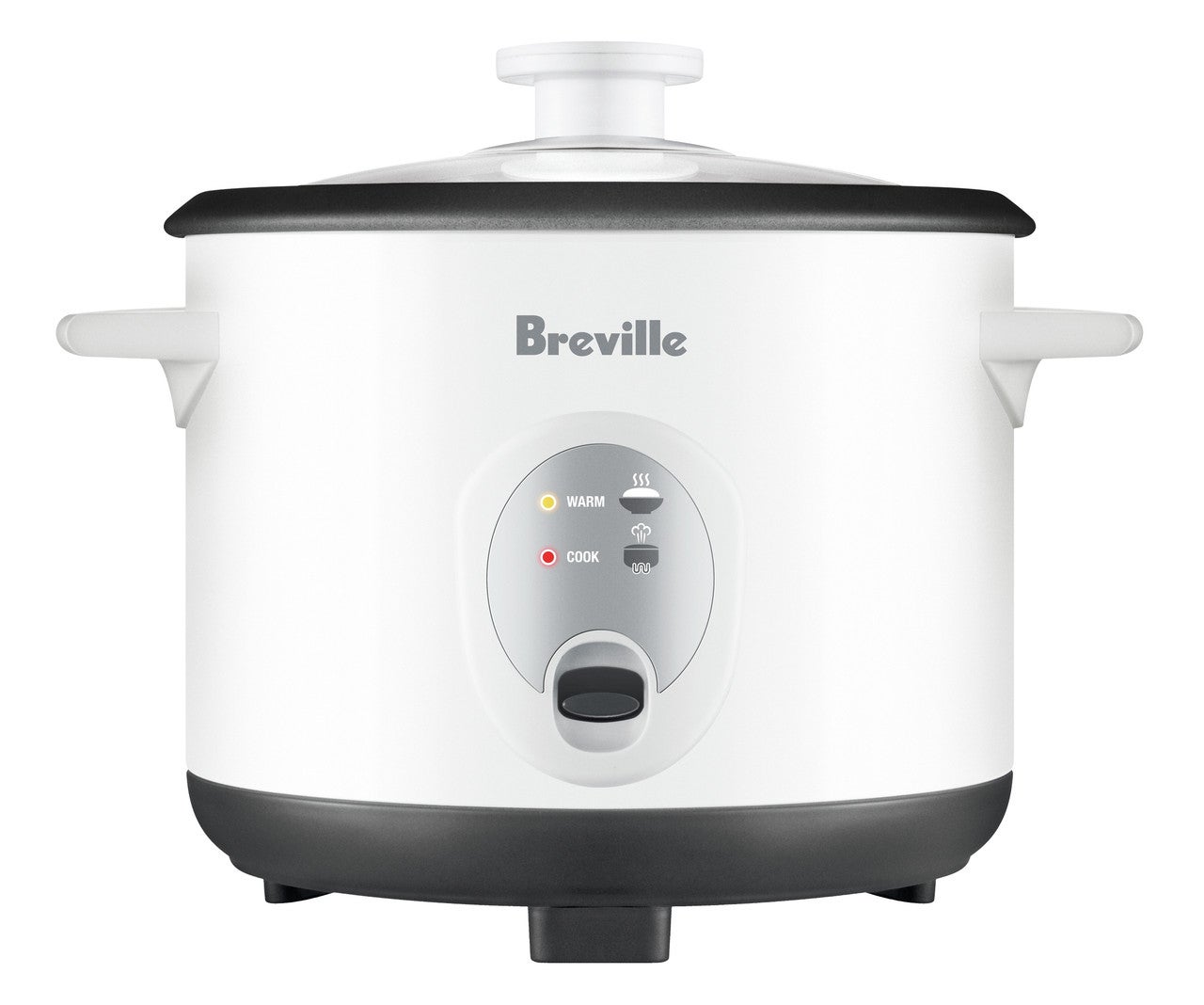
Breville Set & Serve Rice Cooker ($59*)
A great, no-nonsense rice cooker. A simple design provides a glass top so you can keep an eye on your rice, and while there’s no fancy digital display, a simple switch automatically flicks from ‘cook’ to ‘warm’ when the rice is done. The bowl is non-stick, making for easy cleaning, as is the included steamer tray, which allows for easy steaming of vegetables while the rice cooks.
A great option for families, the Breville Set & Serve Rice Cooker cooks up to 8 cups of rice at one time.
Breville Smart Rice Box ($250*)
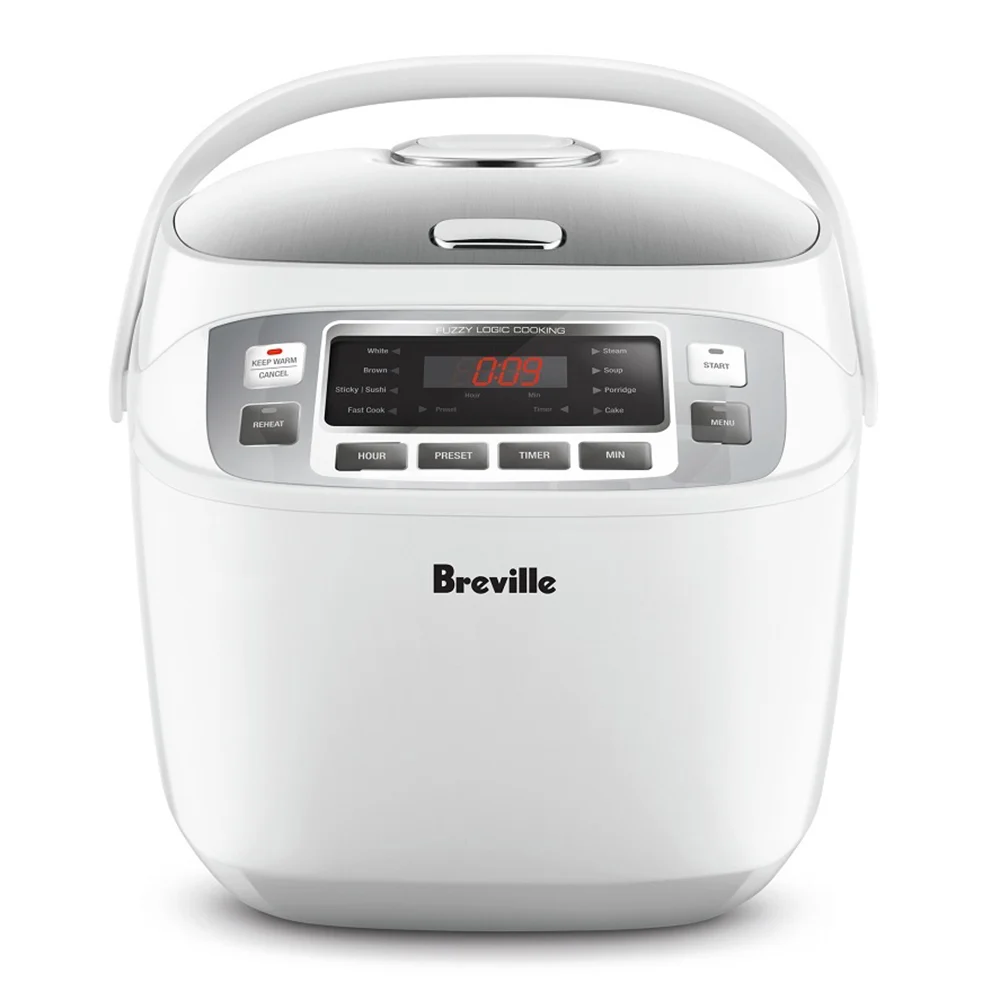
For rice lovers who want a more premium experience, the Breville Smart Rice Box is your go-to. The Breville Smart Rice Box includes Fuzzy Logic technology, which automatically adjusts the temperature at the right time for each stage of rice cooking, no matter which type of rice you choose. The simple digital display allows you to choose exactly what you’re cooking, whether white rice, brown rice, congee, steamed veggies or even a cake! It also has a preset timer that allows you to select a time when you want it to be ready.
Philips HD4514 4L Rice Cooker ($189*)
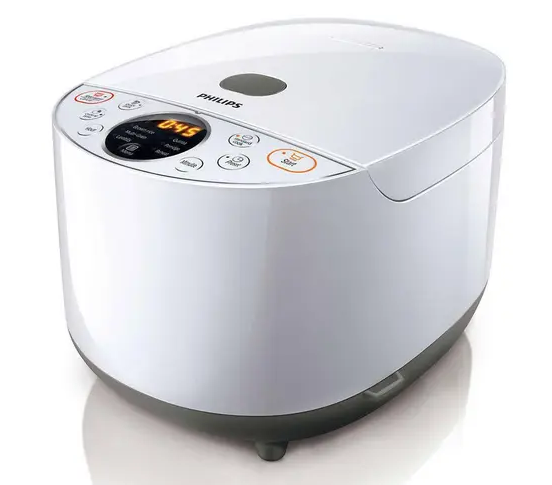
Another excellent option for rice lovers, this rice cooker features a variety of preset cooking functions for different kinds of rice and grains, and a preset timer, so your rice is ready exactly when you want it to be.
It also includes Philips’ innovative FragrantTaste Technology, which locks in the original fragrance of the rice, maintaining its great scent and flavour.
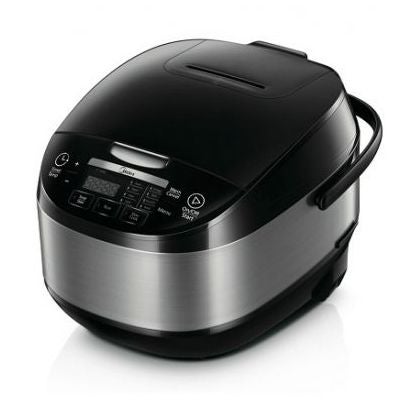
Midea 5L Rice Cooker MB-FS5017 ($149*)
If you want a bit of extra capacity, this 5L rice cooker from Midea offers many of the features found in the above cookers. A preset timer to get rice exactly when you need it, and a variety of cooking methods, provide the perfect cook. All accessed through a simple-to-use LED display.
Anko (Kmart) 7 Cup Rice Cooker ($17*)
It’s hardly a best appliance list without a feature from Kmart.
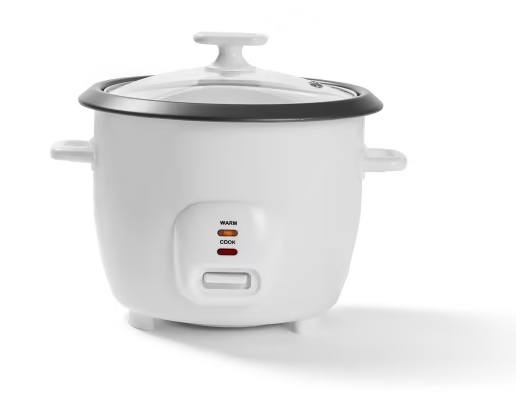
This Anko rice cooker is by no means the best but, at under $20, it might be the best on a budget. An incredibly simple design, with just a single cook function, you can expect great rice without the fuss of boiling a pan on the stove. Its 7-cup capacity is also large enough for most families.
Living & Co Rice Cooker 13 Cup ($40*)
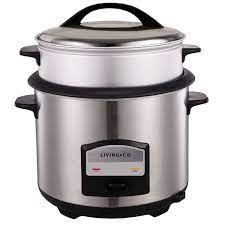
This is another great budget option, perfect for those who cook large amounts of rice, thanks to its massive 13-cup capacity.
While equally basic, with just a single cook function, it does feature a sleek stainless design.
Should I buy a rice cooker? Is it worth it?
A rice cooker can be a great addition to the home. Not only does it guarantee perfectly cooked rice, but it frees up a hob and pot when cooking. And the lack of monitoring a rice cooker needs helps free up your attention, too, which can be the difference between a burnt sauce or not.
If you cook a lot of rice, then a rice cooker can definitely be a lifesaver. And even if you don’t have rice for every meal, a cheap rice cooker can still be a great addition to any kitchen.

About the author of this page
This report was written by Canstar Content Producer, Andrew Broadley. Andrew is an experienced writer with a wide range of industry experience. Starting out, he cut his teeth working as a writer for print and online magazines, and he has worked in both journalism and editorial roles. His content has covered lifestyle and culture, marketing and, more recently, finance for Canstar.


Share this article